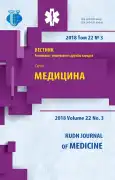DISTRUPTION OF SPERMATOGENESIS. MORPHOLOGICAL ASPECTS
- Authors: Kulchenko NG1
-
Affiliations:
- RUDN University
- Issue: Vol 22, No 3 (2018)
- Pages: 265-271
- Section: SURGERY. ANDROLOGY
- URL: https://journal-vniispk.ru/2313-0245/article/view/345214
- DOI: https://doi.org/10.22363/2313-0245-2018-22-3-265-271
- ID: 345214
Cite item
Full Text
Abstract
At the beginning of the 21st century there is a decline in quality of reproductive health of men around the world. In structure of sterile marriage the men's factor of infertility is found out in approximately 40-50% of cases. A little studied question of male infertility is the question of quantity and quality of gametes in convoluted seminiferous tubules. Aim: to study morphological (quantitative and qualitative) changes of a seminiferous epithelium of patients with male infertility. Materials and Methods: 264 patients with male infertility have been examined. Patients with an obstructive form of infertility, with diseases sexually transmitted, with varicocele, with the revealed genetic and immunological factors of infertility have not been included in the research. Patients with a heavy form of pathospermia (n = 112) were taken a testis biopsy before the ICSI cycle (Intra Cytoplasmic Sperm Injection). Further a condition of the seminiferous epithelium of a testis was estimated with the use of light microscopy. Results: Hypoplasy of a seminiferous epithelium was revealed around 34 (30,5%) men, subtotal aplasia of a seminiferous epithelium - around 59 (52,6%) patients, Sertoli Cell-only syndrome - around 12 (10,7%) and tubular atrophy of convoluted seminiferous tubules - around 7 (6,2% ) patients. Conclusions: The morphological research of testis gives the opportunity to define the extent of pathological process at all stages of a spermatogenesis. Only on the basis of studying of features of a spermatogenesis of the specific patient it is possible to make an algorithm of further personal medical and rehabilitation actions.
References
- Aktan G., Dogru-Abbasoglu S., Kucukgergin C. Mystery of idiopathic male infertility: is oxidative stress an actual risk? Fertil Steril 2013;99:1211-5.
- Dohle G.R., Elzanaty S., van Casteren N.J. Testicular biopsy: clinical practice and interpretation. Asian J Androl. 2012;14:88-93.
- Ibtisham F., Wu J., Xiao M., An L.L., Banker Z., Nawab A., Zhao Y., Li G.H. Progress and future prospect of in vitro spermatogenesis. Oncotarget. 2017;8(39): 66709-66727.
- Kruglov D.P., Kostin A.A., Kaprin A.D., Semin A.V. Sotsialnye aspekty idiopaticheskogo besplodiya. Andrology and Genital Surgery. 2009;2:171-173. (In Russian).
- Ramasamy R., Chiba K., Butler P., Lamb D.J. Male biological clock: a critical analysis of advanced paternal age. Fertil. Steril. 2015;103(6):1402-1406.
- Kulchenko N.G., Myandina G.I., Alhedjoj Hasan. Assotiation-genetic study of polymorphism G-105A SEPS1 gene in male infertility. Research’n Practical Medicine Journal (Issled. prakt. med.). 2018; 5(2): 65-71 (In Russian).
- Boitrelle F., Robin G., Marcelli F., Albert M., Leroy-Martin B., Dewailly D. A predictive score for testicular sperm extraction quality and surgical ICSI outcome in non-obstructive azoospermia: a retrospective study. Human reproduction. 2011;26:3215-3221.
- Kirby E.W., Wiener L.E., Rajanahally S., Crowell K., Coward R.M. Undergoing varicocele repair before assisted reproduction improves pregnancy rate and live birth rate in azoospermic and oligospermic men with a varicocele: a systematic review and meta-analysis. Fertil Steril. 2016;106:1338-1343.
- Vloeberghs V., Verheyen G., Haentjens P., Goossens A., Polyzos N.P., Tournaye H. How successful is TESE-ICSI in couples with non-obstructive azoospermia? Human Reproduction. 2015;30(8):1790-1796.
- Gromov A.I., Builov V.M. Radiation diagnostics and therapy in urology. Мoscow: “GEOTAR-Media” Publ., 2011, 544 p. (In Russian).
- Kraft K.H., Canning D.A., Snyder Iii H.M., Kolon T.F. Undescended Testis Histology Correlation with Adult Hormone Levels and Semen Analysis. The Journal of Urology. 2012;188(4):1429-1435.
- Gonzalez-Marin C., Gosalvez J., Roy R. Types, causes, detection and repair of DNA fragmentation in animal and human sperm cells. Int J Mol Sci. 2012;13:14026-14052.
- Kulchenko N.G. Oksidativnyj stress v razvitii neobstruktivnoj azoospermii. Difficult patient. 2017;15(4-5):44-46. (In Russian)
- Mruk D.D., Cheng C.Y. Sertoli-Sertoli and Sertoli-germ cell interactions and their significance in germ cell movement in the seminiferous epithelium during spermatogenesis. Endocrine Rev 2004; 25:747-806.
- Modarresi T., Hosseinifar H., Daliri Hampa A. Predictive factors of successful microdissection testicular sperm extraction in patients with presumed sertoli cell-only syndrome. Int J Fertil Steril. 2015;9(1):107-112.
- Hussein A. Evaluation of diagnostic testis biopsy and the repetition of testicular sperm extraction surgeries in infertility patients. Fertility and sterility. 2013;100(1):88-93.
- Johnson K.J. Testicular histopathology associated with disruption of the Sertoli cell cytoskeleton. Spermatogenesis. 2014;4:e979106.
- Berookhim B.M., Palermo G.D., Zaninovic N., Rosenwaks Z., Schlegel P.N. Microdissection testicular sperm extraction in men with Sertoli cell-only testicular histology. Fertil Steril. 2014;102(5):1282-1286.
- Abdel Raheem A., Garaffa G., Rushwan N. Testicular histopathology as a predictor of a positive sperm retrieval in men with non-obstructive azoospermia. BJU Int. 2013;111(3):492-499.
- Stouffs K., Gheldof A., Tournaye H. Sertoli Cell-Only Syndrome: Behind the Genetic Scenes. Biomed Res Int. 2016;2016:6191307.
Supplementary files









